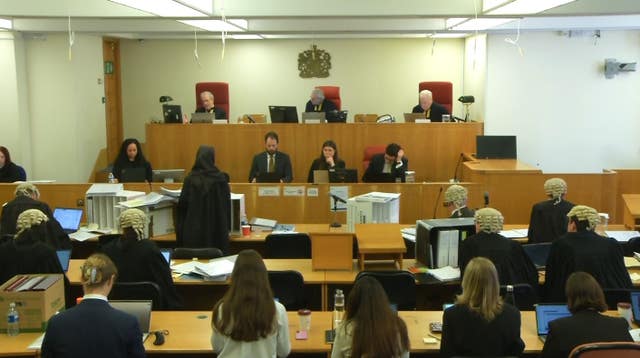Duke of Sussex loses appeal over UK security arrangements
Harry’s barristers told the Court of Appeal last month that his life was ‘at stake’ following the decision to change his security when in the UK.

The Duke of Sussex has lost a Court of Appeal challenge over his security arrangements while in the UK.
Harry, 40, had appealed against the dismissal of his High Court claim against the Home Office over the decision of the Executive Committee for the Protection of Royalty and Public Figures (Ravec) that he should receive a different degree of protection when in the UK.
His barristers told a two-day hearing in April that he was “singled out” for “inferior treatment” and that Ravec did not follow its own “terms of reference” when deciding his security.
The Home Office, which is legally responsible for Ravec’s decisions, opposed the appeal, with its lawyers telling the court that a “bespoke” process was used for Harry and that the duke had “no proper basis” for challenging Ravec’s decision.
In a ruling on Friday, Sir Geoffrey Vos, Lord Justice Bean and Lord Justice Edis dismissed Harry’s appeal.
Reading a summary of the decision, Sir Geoffrey said:”The duke was in effect stepping in and out of the cohort of protection provided by Ravec.
“Outside the UK, he was outside the cohort, but when in the UK, his security would be considered as appropriate.”
He continued: “It was impossible to say that this reasoning was illogical or inappropriate, indeed it seemed sensible.”

Sir Geoffrey also said Ravec’s decision was “understandable and perhaps predictable”.
The judge added that arguments from Harry’s barrister were “powerful and moving”, and that it was “plain that the duke felt badly treated by the system”.
But he continued: “I concluded, having studied the detail of the extensive documentation, I could not say that the duke’s sense of grievance translated into a legal argument for the challenge to Ravec’s decision.”
Harry was not present at Friday’s short hearing at the Royal Courts of Justice in London.
Ravec has delegated responsibility from the Home Office over the provision of protective security arrangements for members of the royal family and others, with involvement from the Metropolitan Police, the Cabinet Office and the royal household.
Last year, retired High Court judge Sir Peter Lane ruled that its decision, taken in early 2020 after the Duke and Duchess of Sussex quit as senior working royals, was lawful.
Harry attended both days of last month’s appeal against the ruling, where his barrister, Shaheed Fatima KC, said his safety, security and life are “at stake”, and that the “human dimension” of the case should not be forgotten.
She added: “We do say that his presence here, and throughout this appeal, is a potent illustration, were one needed, of how much this appeal means to him and his family.”
Judges were told Harry’s case was not that he should be automatically entitled to the same protection he was given as a working royal, and instead he should be subjected to the same processes as other people being considered for protective security, unless there was a “cogent” reason not to.
Lawyers for the duke also said that Ravec did not get an assessment from an “expert specialist body” called the risk management board.
However, in the 21-page written judgment, Sir Geoffrey said he did not think Harry had been “able to demonstrate that the judge was wrong to determine” that Sir Richard Mottram, then chairman of Ravec, had “good reason to depart” from policy.
He said: “In this area of high political sensitivity, the court will inevitably have considerable respect for Sir Richard as a decision maker, whose expertise and experience in the field of royal protection is probably unrivalled.”
The judge also said that the decisions made “were not to deprive the claimant of all protection for all time”, adding: “The decision letter recorded that decisions would be made about the appropriate protection for him on a case-by-case basis when more was known about his visits to the UK.”
During the delivery of the summary of the Court of Appeal’s decision, loud noises thought to be from a nearby animal could be heard in the courtroom.
A Home Office spokesperson said: “We are pleased that the court has found in favour of the Government’s position in this case.
“The UK Government’s protective security system is rigorous and proportionate.
“It is our long-standing policy not to provide detailed information on those arrangements, as doing so could compromise their integrity and affect individuals’ security.”





